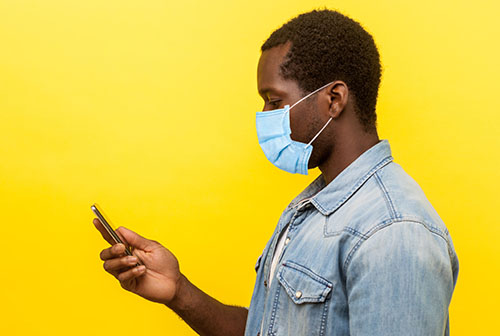A team of radiation oncologists, medical physicists, radiation therapists, and administrators have worked together to create a system to help with social distancing in waiting rooms.

March 22, 2021
Over the last few months, a team of radiation oncologists, medical physicists, radiation therapists, and administrators have worked together to create a system to help with social distancing in Winship Cancer Institute's radiation oncology waiting rooms.
The group, spearheaded by Emory Department of Radiation Oncology faculty Eduard Schreibmann, PhD, DABR, and Pretesh Patel, MD, developed an automated paging system that communicates updates on a patient's appointment status from an application installed on Winship computers.
The application works by sending a text message to a patient's cell phone notifying them that a machine and a therapist are available for their appointment. The application, which is installed on the consoles of Winship's linear accelerators and Edge® radiosurgery system, indicates to radiation therapists when a machine is ready for use via a desktop application. A therapist manually confirms the machine status before a text message is sent to a patient's phone. Phone numbers are pulled from a contact database which includes a patient's appointment time, current machines, and schedules. The desktop application queries the database every five minutes to check on the status of current appointments and sends an update to a patient 15 minutes before a machine is available. The benefit of the new SMS system is that pagers are no longer needed so patients can wait outside or remain in their cars until a machine has opened up. Luckily, the system also doesn't limit participation by requiring that patients download an application on their phone.
An important part of creating this new workflow is ensuring that it truly makes the patient experience better. First, the testing team drafted standard text message alerts for machine availability and machine delays. The CT Simulator team sent initial communications to patients to prepare them for the change and verified patient phone numbers. The application was tested to verify the software correctly estimates delays and retrieves contact information and appointment times from the database. Batch cancellation functionality, or the ability to send cancellations to all patients scheduled for a day, was added at the request of radiation therapists who noted the tool would be useful if the clinic is closed due to technical issues or inclement weather. The team also responded to feedback about the desktop application and reduced the size of the interface to allow more screen space for clinical applications on the therapist's computers.
"This was truly a team effort," says Jeffrey Bradley, MD, FACR, FASTRO, Department of Radiation Oncology interim chair. "A group of extremely innovative people came together to figure out how to improve the patient experience and increase social distancing in our waiting rooms during a pandemic."
On the Winship side, the benefits are two-fold: along with limiting the number of patients in Winship waiting rooms, the application has the potential to communicate more appointment status updates to patients, more machine status updates, and other communications to improve patient satisfaction. Currently, the application only sends alerts for treatment appointments, not all clinic visits.
"We have received positive feedback since going live," says Director of Radiation Therapy Maxine Washington. The therapy team is adjusting to using the technology and recognizes how it will help to manage social distancing in the waiting room.
About 75-85 patients each day are using the new virtual waiting room which went live on Winship's Clifton campus on March 5th. The new system will soon be used at any Winship location with linear accelerators using Varian's ARIA oncology system.

